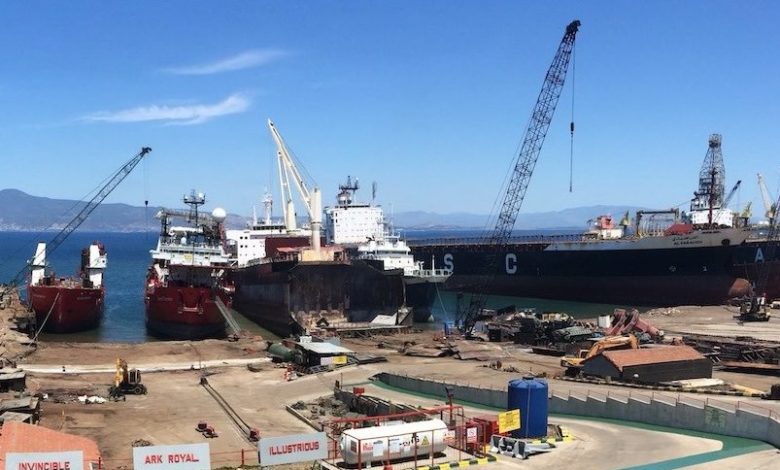Green as standard

Jon Chaplin from Lucion Marine on the realities of sustainably recycling a ship.
An email from Lucion HR arrived last week encouraging us, its employees, to switch to Octopus, a ‘new kind of energy supplier’ with ‘green energy as standard.’ A great idea and although I might end up paying marginally more for my electricity, I don’t mind because it feels good to pay a little extra for green energy.
It got me thinking, are we prepared to pay anything extra for ‘green as standard’ in other areas such as ship recycling? Broker reports and the press often cite ships being sold ‘for green recycling’ but are far less clear on what that means. In a ship scrapping context, we can probably coalesce around green meaning ‘safe, clean and sustainable’ but is there a universal definition we can all get behind?
IACS member certified Hong Kong Convention compliant yards in Alang, of which there are now at least 90, claim to be green. Carnival chose Turkey to recycle its cruise ships because it was the green option. European yards such as Belgium’s Galloo says it has been scrapping ships with “respect for people and the environment” for more than 75 years. Not to mention China, where ships are generally scrapped alongside and the process is highly mechanised.
Last year it was reported that the Norwegian green ship recycling special list Green Yard Group has entered into an agreement with financially troubled shipbuilder Kleven Verft on a solution to take over the shipyard. Could that be any greener?
The big question now being asked by Alang’s ship recyclers who invested in concrete floors, heavy lift and barge cranes, worker training and certification is whether they are entitled to expect a degree of payback from shipowners (and cash buyers) in the form of cheaper ships?
By ‘cash buyer’, I mean the company or individual who negotiates with the broker, eventually buys the ship and then sells it to a ship recycler. Or possibly not, having decided that more money can be made from further trading the vessel. Equally, a cash buyer may buy a ship ‘for further trading’, then change course, having decided a final voyage to Alang would be more rewarding.
Naturally enough, cash buyers prefer to channel ships to yards either they own, are controlled by close relatives, or with whom they have an existing arrangement. One consequence is that yards without an affiliated cash buying arm have less choice of vessels to purchase and recycle.
With so few ships being sold with green terms attached, are private arrangements between cash buyers and their preferred yards in effect stifling the opportunity for other HKC yards in India to raise standards? And wouldn’t shipowners owners achieve higher prices if more yards were bidding?
To avoid nasty surprises, the contract between owner and cash buyer may well demand the vessel is recycled at a “HKC compliant facility in Alang”, better still a numbered plot, in theory protecting the owner from seeing the ship unexpectedly wash up on the shores of Chattogram, where all but one yard (PHP Ship Breaking & Recycling Industries) is non-HKC compliant. (And yes, more Bangladeshi yards are in the process of HKC compliance certification, their plans unfortunately delayed by the pandemic.)
Now that the vast majority of yards in Alang are HKC compliant and the playing field is level, has the prospect of a green dividend, in the shape of a $20-30 per ldt discount gone out with the tide, never to return? Many argue the investments (concrete, machinery, worker dormitories etc) were long overdue and should be paid for by the profits of yore. And anyway, a free market dictates its own terms, so suck it up.
But like Octopus, if your firm invests in planet-protecting, safety-enhancing improvements is it reasonable to expect modest recognition from your clients?
There are several lists of ‘approved yards’ in circulation but what exactly constitutes an ‘approved’ yard is as nebulous as the definition of green recycling. Japanese giant K Line is said to have a list of 30 HKC compliant facilities it may choose from, A.P. Moller – Maersk and Swire have a list, albeit more modest, of yards permitted to recycle their ships. Lloyd’s Register has audited a select few and about 20 Alang plots have applied to the EU for approval. Some recycling consultants offer their shipowner clients a list of self-audited and approved facilities.
It has been put to me that every list of so-called approved recyclers comes with a sell-by date, which could be next week if there is significant turnover among the workers. Hence the peace of mind offered by employing independent supervision – to hold the yard to its promises.
It seems clear that recyclers do benefit from having a responsible owner closely involved in the recycling process in terms of training and methodology. And by ‘closely involved’, I mean physically present to supervise the removal of oil, loose material and chemicals, monitor the cutting, downstream waste disposal and checking PPE.
Can owners with a ship to scrap make a proper assessment of a ‘green’ recycling yard (independent of Class, cash buyer or NGO) without sending a superintendent from head office to Alang? Of course, and many do by engaging specialist firms such as Lucion Marine, who offer commercial and technical guidance through the entire recycling process.
With investors and financial institutions piling on the pressure for independently audited ESG, isn’t it time to embrace better recycling practices? Call it green if you like.

I can only see this working if the green recycling option is somehow standard. i can’t see factoring in the scrappage cost into the new build price as ever being viable, but this seems one way to incentivise green recycling and it may also impact ships design. this may be a nice idea but i can’t ever see our industry adopting such an approach?